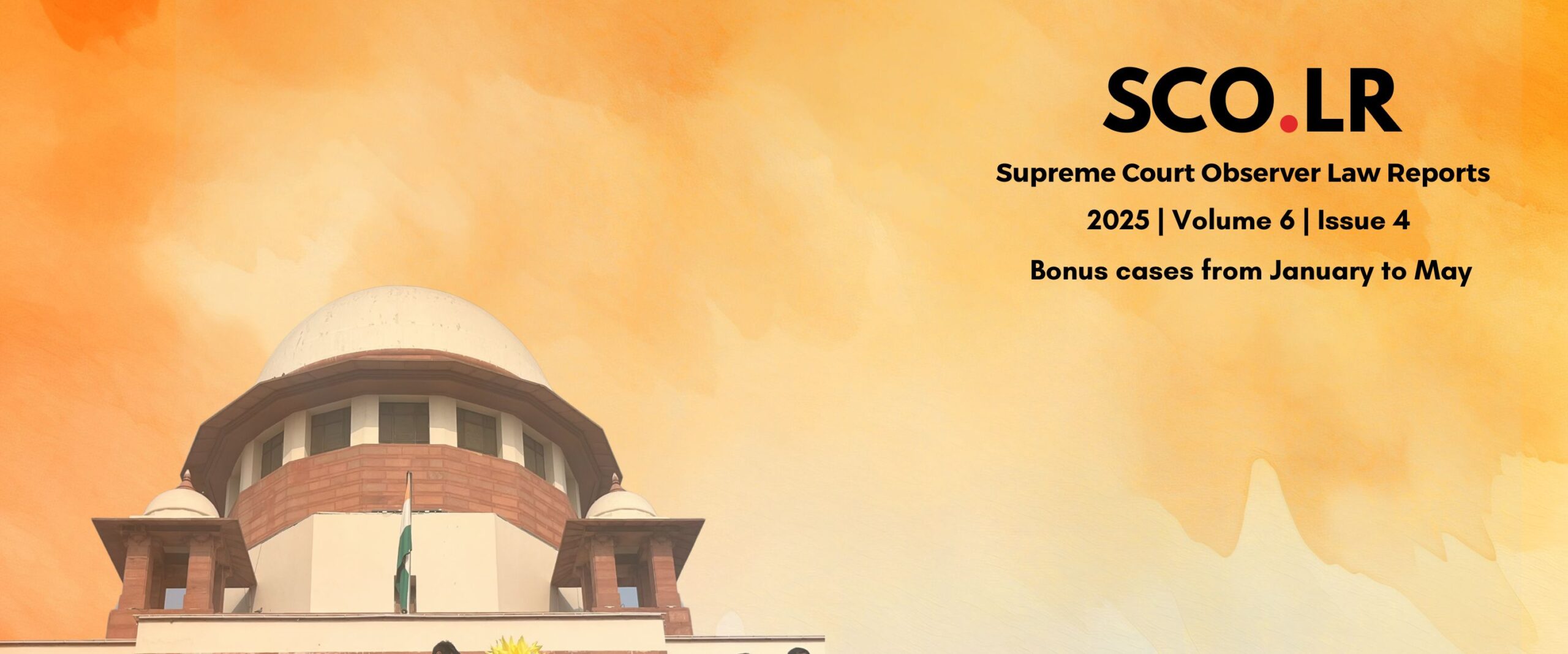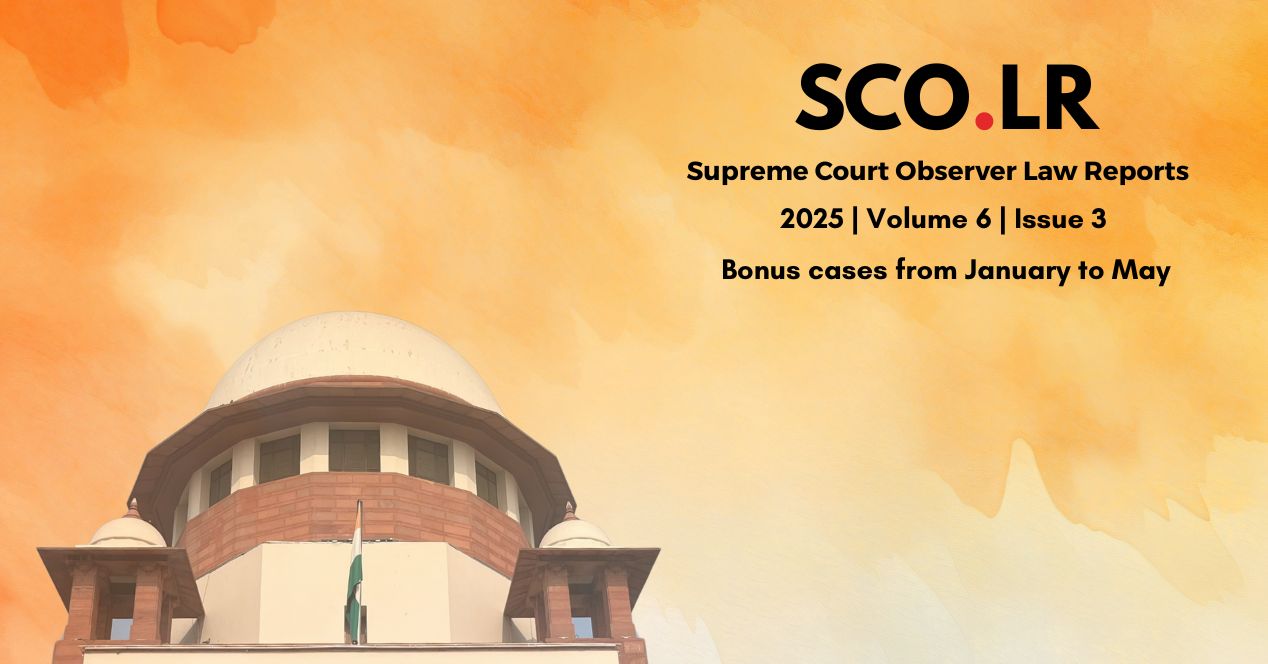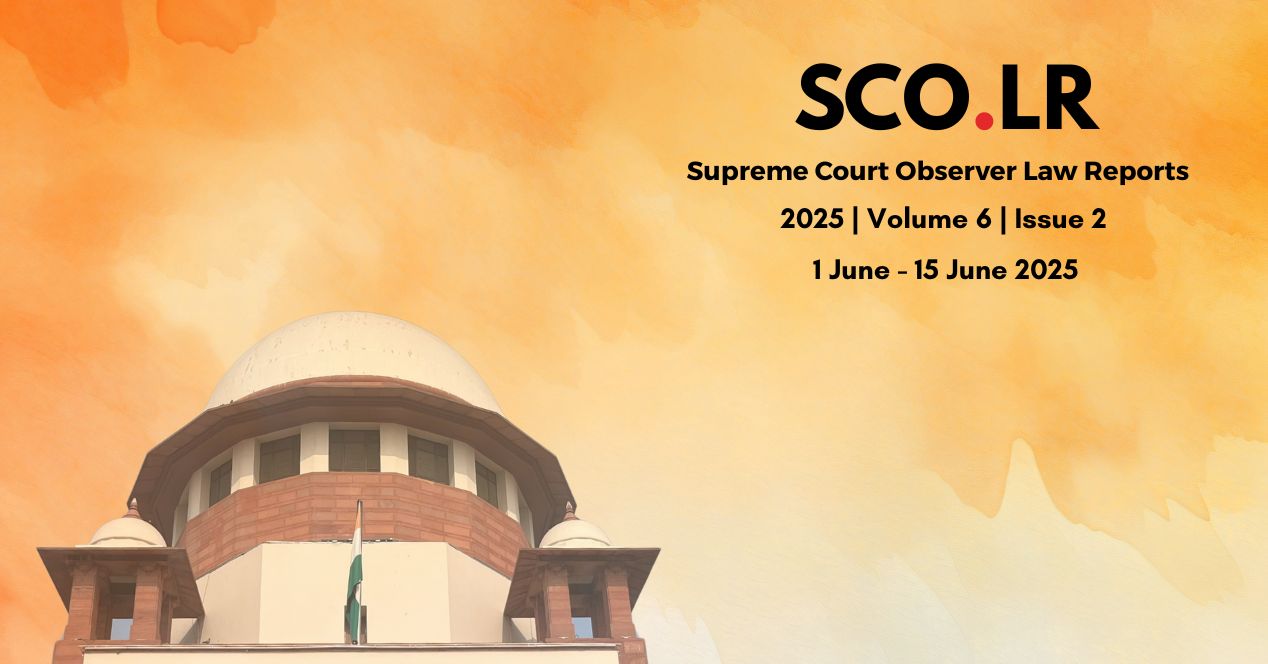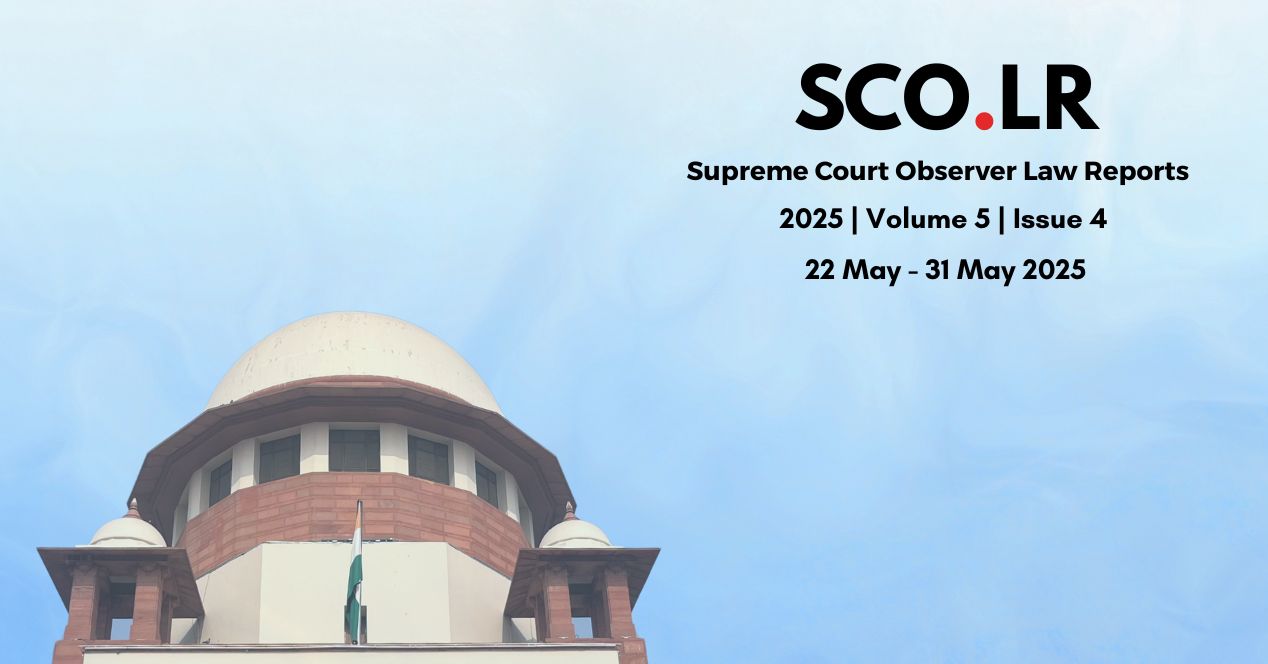Analysis
SCO.LR | 2025 | Volume 6 | Issue 4
In this Issue of SCO.LR, we summarise five significant and unmissable bonus judgements from January to May 2025

Today, we bring you Volume 6, Issue 4 of the Supreme Court Observer Law Reports (SCO.LR). This is the final Issue of SCO.LR for June 2025.
Last week, like the week before, the Court did not deliver any judgements as it was on its partial working days. So, we bring you an additional five judgements from each month of the year, from January to May.
Can a company be sued as a State? Can a person be acquitted because he had no motive to commit a crime? Is registration enough to transfer the title of a property?
The judgements in this Issue answer all these questions and more. Happy reading!
**********
The Supreme Court Observer Law Reports 2025
SCO.LR |Volume 6 | Issue 4
Bonus Judgements from January– May 2025
**********
Private Company not Amenable to Writ Jurisdiction
24 January 2025
Citation: 2025 INSC 117 | 2025 SCO.LR 6(4)[16]
Bench: Justices J.B. Pardiwala and R. Mahadevan
The Supreme Court held that a writ petition under Article 226 cannot be filed against a private company in a High Court, unless it performs a public duty or function.
The dispute arose from a gold loan transaction between S. Shobha and Muthoot Finance Ltd. Shobha filed a writ petition at the Karnataka High Court, which a single-judge Bench entertained. The judge reasoned that Muthoot Finance had breached a previously issued interim order. A Division Bench of the High Court refused to endorse this view. The judges held that Muthoot Finance Ltd. did not fall under the ambit of a “State” under Article 12.
The Supreme Court upheld the Division Bench’s view. It rejected petitioners’ arguments that Muthoot Finance, being an RBI-governed non-banking financial institution, is amenable to writ jurisdiction if it breaches RBI rules and regulations. The Court held that the RBI guidelines are only regulatory measures and do not imply control over the company.
Keywords/phrases: Constitution of India—Article 12—Article 226—writ petitions cannot be filed against private companies—Private companies considered “State” only when performing a public function
Read the Judgement here.
Mind map**********
Cognisance Against Public Servants Without Sanction Invalid
Suneeti Toteja v State of Uttar Pradesh
25 February 2025
Citation: 2025 INSC 267 | 2025 SCO.LR 6(4)[17]
Bench: Justices B.V. Nagarathna and S.C. Sharma
The Supreme Court held that a Magistrate cannot take cognisance of a case against a public servant without obtaining prior sanction from the competent authority, under Section 197 of the Code of Criminal Procedure, 1973 (Cr.PC.).
Suneeti Toteja, an officer of the Bureau of Indian Standards (BIS) was the Presiding Officer of the Internal Complaints Committee established to inquire into a sexual harassment complaint. Allegations surfaced in 2020 that Toteja had filed a counter-affidavit in the Central Administrative Tribunal, without the complainant’s consent. She also allegedly pressured the complainant to withdraw the case. The BIS refused to prosecute Toteja stating that her actions were within the limits of official duty. Despite this, the Magistrate took cognisance of the matter. The High Court dismissed her plea to quash the chargesheet.
The Supreme Court quashed the criminal proceedings against Toteja citing Section 197 CrPC. The provision bars courts from taking cognisance of offences allegedly committed by public servants without prior sanction, if the acts are in discharge of official duties. The judgment also clarified that there is no “deemed sanction,” under the Cr.PC.
Keywords/phrases: Code of Criminal Procedure, 1973—Section 197—sexual harassment inquiry—Internal Complaints Committeeprior sanction necessary to raise complaints against public servants—public servant immunity—official duty—judicial cognisance—no deemed sanction
Read the Judgement here
Mind map**********
Officers to ‘Read or Hear Words’ before Registration of FIR in Free Speech Cases
Imran Pratapgarhi v State of Gujarat
28 March 2025
Citation: 2025 INSC 410 | 2025 SCO.LR 6(4)[18]
Bench: Justices A.S. Oka and Ujjal Bhuyan
The Supreme Court held that the police must “read or hear” the words alleged to promote enmity between groups before registering a First Information Report (FIR) for a cognisable offence under Section 196 of the Bharatiya Nyaya Sanhita, 2023 (BNS).
The FIR was filed against Member of Parliament Imran Pratapghari, under Section 196 of the BNS. Pratapghari had recited a poem on social media. It was alleged that the recital incited communal tensions and social disharmony. The Gujarat High Court found that the poem “certainly created disturbance”. Pratapgarhi argued that the poem carried a message of love and non-violence and that the Gujarat High Court missed the message.
The Supreme Court held that no offence under Section 196 could be made out as the poem did not refer to any religious community. It held that Section 173(3) of the Bharatiya Nagarik Suraksha Sanhita, 2023 states that the officer is duty-bound to inquire if an offence can be made out in a complaint.
Key words/phrases: Constitution of India—Article 19—freedom of speech and expression—Bhartiya Nyaya Sanhita, 2023—Section 196—Offence of promoting enmity between groups—FIR registered— Supreme Court quashes FIR as no reference to religious community was made—held that police must conduct preliminary inquiry for cognisable offences before registration
Read the Judgement here.
Mind map**********
Mere Absence of Motive Does not Result in Acquittal
Subhash Aggarwal v The State of NCT of Delhi
17 April 2025
Citations: 2025 INSC 499 | 2025 SCO.LR 6(4)[19]
Bench: Justices Sudhanshu Dhulia and K.V.Chandran
The Supreme Court held that the absence of a strong motive does not automatically result in an acquittal.
Subhash Aggarwal was the first person to discover the body of his youngest son. He alleged that his son had killed himself with a screwdriver though no blood stains were found on it. Further, gunshot residue particles were found in the right hand of the accused. Evidence given by family members indicated that the accused had good relations with the deceased.
The Supreme Court held that when the circumstances convincingly provide an unbroken chain of events leading to the guilt of the accused, the total absence of a motive is of no consequence in deciding punishment for murder under Section 302 of the IPC.
Key words/phrases: Indian Penal Code,1890—Section 302—punishment for murder—Appellant father convicted for son’s murder—absence of motive on the part of the accused—circumstantial evidence against the accused—Court holds motive not imperative—conviction upheld
Read the Judgement here.
Mind map**********
Unregistered Sale Can’t Confer Title Even if Subsequent Transaction is Registered
Mahnoor Fatima Imran v M/S Visweswara Infrastructure Pvt.
7 May 2025
Citations: 2025 INSC 646 | 2025 SCO.LR 6(4)[20]
Bench: Justices Sudhanshu Dhulia and K.V. Chandran
The Supreme Court held that a subsequent registered sale transaction based on an unregistered sale agreement does not make the transaction valid.
The Telangana State Industrial Infrastructure Corporation Limited (TSIIC) claimed that a 53-acre land vested with it under the land ceiling laws. Visweswara Infrastructure claimed ownership on the land through a registered sale deed from a Bhavana Co-operative Housing Society. The Society claimed to have title over the land based on an unregistered sale agreement allegedly executed by the original owners’ General Powers of Attorney in 1982. Visweswara Infrastructure sought to restrain the TSIIC from taking possession of the land. A Single Judge of the High Court dismissed the respondent’s petition, finding their title and possession unproven. A Division Bench reversed it.
The Supreme Court restored the Single Judge’s Order, holding that the 1982 agreement was invalid as it was not registered. The subsequent sale deed, though registered, lacked legal foundation.
Key words and phrases: Registration Act 1908—Section 17 mandates registration—original agreement unregistered in the present case—subsequent sale invalid
Read the Judgement here.
Mind map



